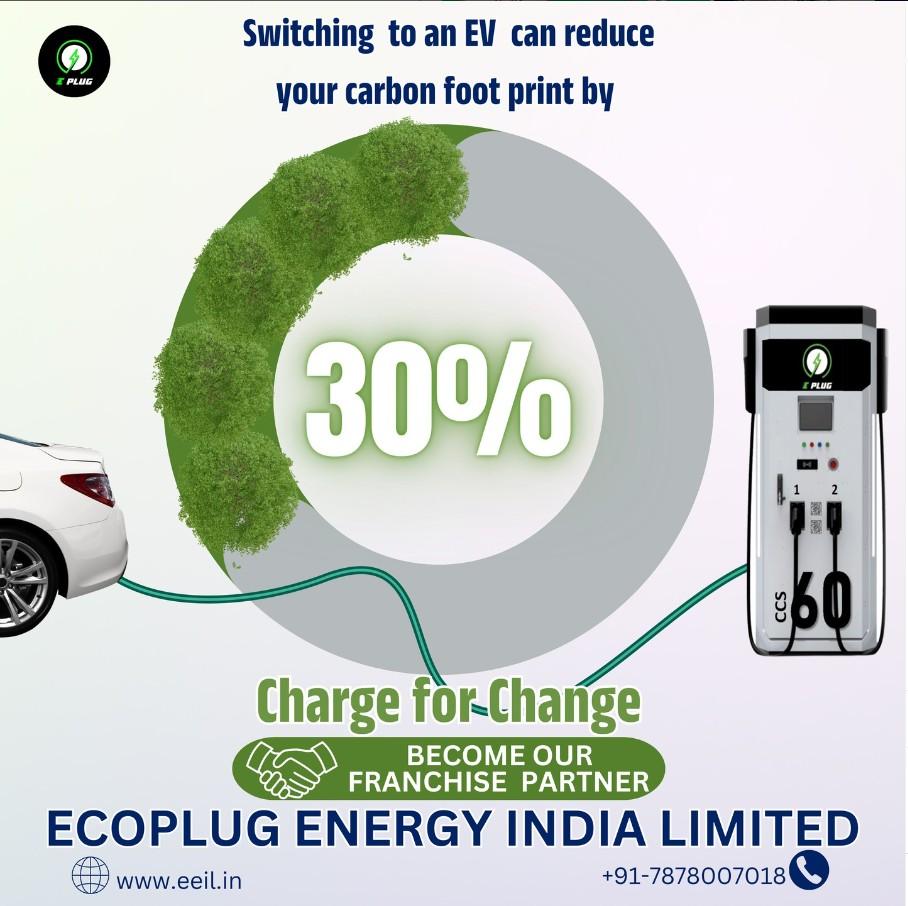
11-Nov-2024
Switch to an EV and Reduce Your Carbon Footprint: Drive Towards a Greener Future
As climate change becomes an ever-growing concern, finding sustainable solutions to reduce our environmental impact is more important than ever. One of the most effective ways to contribute to a greener planet is by switching from a conventional gasoline or diesel vehicle to an electric vehicle (EV). The shift to electric mobility offers a wide range of environmental benefits, primarily in the reduction of your carbon footprint. At EcoPlug Energy India Limited, we are passionate about promoting cleaner, more sustainable transportation options. In this blog post, we will explore how making the switch to an electric vehicle can help you reduce your carbon footprint and take a significant step towards a more sustainable future.
Understanding Carbon Footprint and Its Impact
Before diving into how EVs contribute to a greener world, it's important to understand what a carbon footprint is. Your carbon footprint refers to the total amount of greenhouse gases (GHGs) emitted into the atmosphere as a result of your activities, including driving. These gases, especially carbon dioxide (CO2), trap heat in the atmosphere and contribute to global warming.
Conventional vehicles, powered by gasoline or diesel, are major contributors to the carbon footprint, as they release significant amounts of CO2 every time they are driven. On average, a gasoline-powered car emits about 4.6 metric tons of CO2 per year. This figure can vary based on the vehicle's fuel efficiency, but it's clear that traditional internal combustion engine (ICE) vehicles are responsible for a substantial portion of global CO2 emissions.
How EVs Help in Reducing Your Carbon Footprint
Switching to an electric vehicle offers a direct way to reduce your personal contribution to CO2 emissions. Here’s how:
1. Zero Tailpipe Emissions
One of the most compelling reasons to switch to an EV is that electric vehicles produce zero tailpipe emissions. Unlike gasoline or diesel-powered vehicles, EVs do not release harmful pollutants, such as carbon dioxide (CO2), nitrogen oxides (NOx), and particulate matter (PM), into the atmosphere. This is especially important in urban areas, where air pollution is a significant health concern. By choosing an EV, you can drastically reduce your contribution to air pollution and improve the quality of air in your community.
2. Reduced Lifecycle Emissions
While it’s true that manufacturing an electric vehicle may initially generate more emissions compared to conventional vehicles—due to the energy-intensive process of producing batteries—the overall lifecycle emissions of an EV are significantly lower. Over the life of the vehicle, the emissions produced by charging and operating an EV are much lower than those of an internal combustion engine vehicle. Studies have shown that EVs can reduce lifecycle emissions by up to 70 compared to traditional vehicles when considering factors like fuel consumption and vehicle maintenance.
This reduction in emissions continues to grow as the electric grid becomes cleaner with more renewable energy sources like wind and solar coming online. The more we transition to clean energy, the lower the carbon footprint of EVs will become.
3. Energy Efficiency of EVs
Electric vehicles are inherently more energy-efficient than conventional vehicles. EVs convert over 85 of the electrical energy from the grid to power the wheels, compared to just 20-30 efficiency for traditional gasoline engines. This efficiency means that for every unit of energy used, EVs travel farther while emitting far fewer greenhouse gases. This directly reduces the environmental impact of your daily commute, especially if you charge your EV using renewable energy sources.
At EcoPlug Energy India Limited, we provide top-quality EV charging solutions that help maximize your vehicle’s efficiency and ensure that it runs at its optimal performance.
The Role of Renewable Energy in Reducing Carbon Emissions
While switching to an EV can significantly reduce your carbon footprint, the impact can be even greater if you charge your vehicle using renewable energy. Many EV owners choose to pair their electric vehicles with solar panels or opt for charging stations powered by renewable energy sources. When you charge your EV with clean energy, the carbon footprint of your vehicle is reduced even further.
By choosing a green charging option, you are not only reducing your own carbon emissions but also helping to support the transition to a cleaner, renewable-powered grid. This is especially true when you charge your EV during times of peak renewable energy generation, such as during sunny afternoons when solar energy production is at its highest.
At EcoPlug Energy India Limited, we are committed to promoting sustainable solutions, which is why we offer EV charging stations that are designed to integrate seamlessly with renewable energy sources, further reducing your vehicle's environmental impact.
Additional Environmental Benefits of EVs
Apart from reducing carbon emissions, EVs also offer other environmental advantages:
1. Reduced Noise Pollution
Electric vehicles are much quieter than conventional cars. With no internal combustion engine, EVs generate far less noise pollution, which can have a positive impact on urban areas, particularly in cities with heavy traffic. A quieter environment not only improves quality of life but also reduces stress and noise-related health problems in urban populations.
2. Less Wear and Tear on the Environment
EVs have fewer moving parts than traditional vehicles, meaning less wear and tear over time. Traditional vehicles require more frequent oil changes, air filter replacements, and more, which often results in discarded components that end up in landfills. In contrast, EVs generally require less maintenance and produce fewer waste products, contributing to less environmental strain over the vehicle’s lifetime.
3. Preservation of Natural Resources
Electric vehicles help reduce the dependence on fossil fuels, which are non-renewable resources that contribute to environmental degradation. By using electricity as a power source, EVs help in conserving natural resources and promote the use of renewable energy sources, thereby mitigating the environmental impact of fossil fuel extraction and consumption.
3 Unmissable Reasons to Install an EV Charging Station at Your Restaurant: Boost Customer Loyalty, Revenue, an

In today’s rapidly evolving business environment, customers are no longer looking for just a good meal—they are seeking out businesses that align with their values, particularl...
6 min ago

Ecoplug Energy India Limited Franchise Process In Hindi

नमस्कार दोस्तों, आज इस वीडियो में हम विस्तार से जानेंगे ECOPLUG EV फ्रैंचा�...
6 min ago

Future-Proof Your Electric Vehicle Charging Station with Ecoplug: A Smart Solution for Sustainable Mobility

In today’s era, where electric vehicles (EVs) are not just becoming an essential part of personal transportation but are also presenting a sustainable option for protecting the e...
6 min ago

how to keep your electric vehicle and battries safe

Electric vehicles (EVs) are rapidly transforming the transportation landscape, offering significant environmental benefits, reduced operating costs, and a smoother driving experien...
6 min ago

Experience Hassle-Free EV Charging with EcoPlug Energy India Limited: Your Gateway to Convenient, Sustainable

As the world moves toward a more sustainable future, the adoption of electric vehicles (EVs) is on the rise, and with it, the need for accessible and reliable charging infrastructu...
6 min ago

Copyright © 2024 ECOPLUG ENERGY INDIA LIMITED, All Rights Reserved.